Text
(6th meeting) First Session Ad Hoc Committee to Draft Terms of Reference for a United Nations Framework Convention on International Tax Cooperation.
. 2.cont.'
- Dialogue with international organizations
- Discussion of additional topics for high-level commitments
United Nations Headquarters.
First Session Ad Hoc Committee to Draft Terms of Reference for a United Nations Framework Convention on International Tax Cooperation will be held from 26 April – 8 May 2024.
UN Web TV.
Watch the (6th meeting) First Session Ad Hoc Committee to Draft Terms of Reference for a UN Framework Convention on International Tax Cooperation.
United Nations Department of Economic and Social Affairs (DESA)
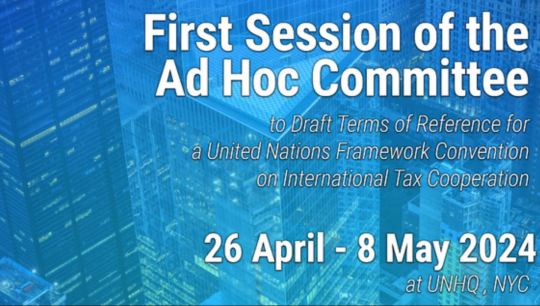
#undesa#plenary meeting#ad hoc intergovernmental committee#tax procedures#international taxation#wealth taxation#tax cooperation#United Nations Framework Convention on International Tax Cooperation#unhq
0 notes
Text
(5th meeting) First Session Ad Hoc Committee to Draft Terms of Reference for a United Nations Framework Convention on International Tax Cooperation.
2. cont.'
(b) substantive elements - Discussion of some possible topics for high-level commitments, including: - domestic resource mobilization and capacity building - effective taxation of high-net worth individuals, including wealth taxation; - ensuring that tax measures contribute to addressing environmental challenges.
Related Sites and Documents
Ad Hoc Committee Website
Programme of Work
Watch the (5th meeting) First Session Ad Hoc Committee to Draft Terms of Reference for a United Nations Framework Convention on International Tax Cooperation.
#environmental challenges#wealth taxation#tax procedures#- domestic resource mobilization#capacity building#international taxation#ad hoc intergovernmental committee#plenary meeting#undesa#unhq#rule of law
0 notes
Text
(4th meeting) First Session Ad Hoc Committee to Draft Terms o f Reference for a United Nations Framework Convention on International tax cooperation.
2. (continued) (b) substantive elements - Discussion of: - Preamble - Objectives - Principles.
Watch the (4th meeting) First Session Ad Hoc Committee to Draft Terms o f Reference for a United Nations Framework Convention on Interntional tax cooperation!
First Session Ad Hoc Committee to Draft Terms of Reference for a United Nations Framework Convention on International tax cooperation will be held from 26 April – 8 May 2024.
#tax procedures#tax avoidance#tax evasion#international taxation#rule of law#informal discussion#plenary meeting#unhq#ad hoc intergovernmental committee#United Nations Framework Convention on International tax cooperation
0 notes
Text
(3rd meeting) First Session Ad Hoc Committee to Draft Terms of Reference for a United Nations Framework Convention on International Tax Cooperation.
2. Structural elements of a framework convention: substantive scoping (b) Substantive elements - First reading and discussion of ToRs Skeleton
Ad Hoc Committee Website
Programme of Work
Watch the (3rd meeting) First Session Ad Hoc Committee to Draft Terms of Reference for a United Nations Framework Convention on International Tax Cooperation.

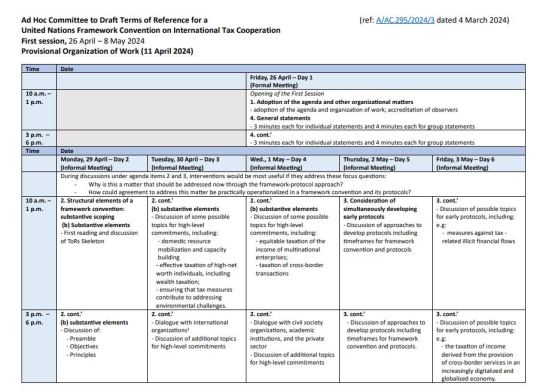
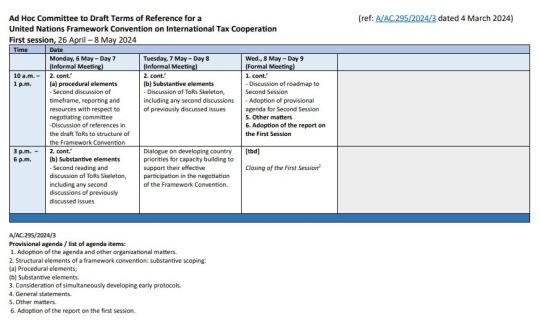
#undesa#tax avoidance#tax evasion#ad hoc intergovernmental committee#UNHQ#Intergovernmental organizations#stakeholders#informal discussion
0 notes
Text
(2nd meeting) First Session Ad Hoc Committee to Draft Terms of Reference for a United Nations Framework Convention on International Tax Cooperation.
Watch the (2nd meeting) First Session Ad Hoc Committee to Draft Terms of Reference for a United Nations Framework Convention on International Tax Cooperation.

#undesa#tax avoidance#tax evasion#Tax procedures#rule of law#ad hoc intergovernmental committee#international taxation#international tax cooperation#informal discussion#plenary meeting#unhq
0 notes
Text
(1st meeting) First Session Ad Hoc Committee to Draft Terms of Reference for a United Nations Framework Convention on International Tax Cooperation.
First Session Ad Hoc Committee to Draft Terms of Reference for a United Nations Framework Convention on International Tax Cooperation will be held from 26 April – 8 May 2024.
Watch the (1st meeting) First Session Ad Hoc Committee to Draft Terms of Reference for a UN Framework Convention on International Tax Cooperation
#ad hoc intergovernmental committee#undesa#tax procedures#tax avoidance#tax evasion#international taxation#International tax cooperation#rule of law#United Nations Framework Convention on International Tax Cooperation#plenary meeting#unhq
0 notes
Text
Press Conference: Launch of the Financing for Sustainable Development Report 2024: Financing for Development at a Crossroads.
Amina Mohammed will be joined by Mr. Navid Hanif, Assistant Secretary-General for Economic Development, DESA and Ms. Shari Spiegel, Acting Director, Financing for Sustainable Development Office (FSDO), DESA.
Press Conference: Amina Mohammed, UN Deputy Secretary-General on the Financing for Sustainable Development Report 2024: Financing for Development at a Crossroads

#Financing for Development#Press Conference#undesa#united nations department of economic and social affairs#economic development#Financing for Sustainable Development Office (FSDO)#financing4dev#un deputy secretary-general
0 notes
Text
Remarks at Organizational Session of the Ad Hoc Committee to Draft Terms of Reference for a United Nations Framework Convention on International Tax Cooperation.

Excellencies, Distinguished Delegates, Ladies and Gentlemen,
I have the honour to declare open this organizational session of the Ad Hoc Committee to Draft Terms of Reference for a United Nations Framework Convention on International Tax Cooperation. On behalf of the Secretariat, I would like to welcome everyone present here today and following online via UN Web TV.
The General Assembly established this new, ad hoc intergovernmental body by its resolution 78/230 of 22 December 2023. This was a historic step forward in promoting inclusive and effective international tax cooperation at the United Nations. It is also a key step in achieving the Addis Ababa Action Agenda and the 2030 Agenda for Sustainable Development.
Aggressive tax avoidance and tax evasion have a corrosive effect on public trust, financial integrity, the rule of law and sustainable development across the globe. Advancing inclusive and effective international tax cooperation can address these challenges and foster trust. It can also help countries mobilize domestic resources and support investment in the SDGs.
This UN intergovernmental process can help shape an international tax system that serves multiple purposes. The system must respect countries’ sovereignty and the way markets operate and business is done in our modern world. It must also establish transparent international tax rules and procedures that respond to the needs, priorities, and capacities of all countries.
Distinguished Delegates,
Great strides have been made in international tax cooperation, at the OECD, the United Nations, and in regional and sub-regional tax organizations, that engage all stakeholders in tax systems.
Despite best efforts to address global taxation issues, many developing countries still feel that they have little to no contribution in setting the international tax rules that address their priorities.
This Ad Hoc Committee convenes for the first time, with the mandate to develop draft terms of reference for a UN Framework Convention on International Tax Cooperation.
All UN Member States must make the most of this rare opportunity to develop an instrument that addresses global challenges that are not adequately addressed by existing arrangements, including the priorities of developing countries. Such an instrument would strengthen synergies with existing arrangements.
A framework-protocol approach would not solve all the challenges or create opportunities in international tax at once. Yet, it could lead to increased revenue collection, curb tax evasion and illicit financial flows, and ensure tax is used more effectively as a policy lever for sustainable development in the short to medium term.
I would like to thank the Bureau-designate for its hard work in preparing for this organizational session over the past several weeks, in consultation with Member States through the regional groups.
It is now up to this Ad Hoc Committee, over the next three days, to lay the Committee’s approach, the organizational foundations, and initiate substantive preparations to deliver on its mandate.
The first task before the Committee is electing its officers. The resolution specifies that the bureau of the ad hoc intergovernmental committee shall be made up of not more than 20 members. It shall consist of one chair, one rapporteur, and 18 vice-chairs, elected on the basis of balanced geographical representation and taking into account gender balance, with each of the five regional groups equally represented.
I wish you every success in this session and on the delivery of your important mandate.
Thank you!
#United Nations Framework Convention on International Tax Cooperation#United Nations Department of Economic and Social Affairs#International Tax Cooperation#tax avoidance#tax evasion#public trust#financial integrity#rule of law#ad hoc intergovernmental committee
0 notes
Text
Opening plenary (SDG Action Weekend, Mobilization Day).
As the opening to SDG Action Weekend, the opening plenary of the Saturday proceedings will emphasize the urgency of this moment. Halfway to the 2030 Deadline, we are not halfway there –many goals remain off-track and global economic, geopolitical, and environmental headwinds threaten progress in other areas.
The 2030 Agenda is a promise, not a guarantee, and humanity is in the hotseat. In the face of these challenges, participants will be reminded by speakers that transformation, at scale, is possible. We have the right tools and capabilities but now we need everyone, individually and collectively, to channel these resources more efficiently to deliver on the SDGs. This session will feature a keynote speech from a former Head of State, providing a sober reality check of the moment and emphasizing the possibility for us to achieve our promise. To close, an empowering performance from Yemi Aladewill set an uplifting tone as stakeholders head into the programming of SDG Mobilization Day.
---
To maximize the SDG Summit's impact, the Secretary General is convening an SDG Action Weekend, which will generate opportunities for stakeholders, UN entities, and Member States to convene inside the United Nations Headquarters and set out specific commitments and contributions to drive SDG transformation between now and 2030.
The SDG Action Weekend will consist of the SDG Mobilization Day on Saturday, 16 September, and the SDG Acceleration Day on Sunday, 17 September at UNHQ in New York.
The SDG Mobilization Day (16 September) will create an opportunity for stakeholders from all sectors to convene inside the United Nations Headquarters and mobilize towards an ambitious SDG Summit and UN General Assembly High-Level Week.
The SDG Acceleration Day (17 September) will be centred around the UN High-Impact Initiatives
The SDG Summit on 18-19 September will mark the mid point of the SDGs. It must secure the breakthroughs and momentum needed to change course and achieve the SDGs by 2030. To maximize the Summit's impact, the Secretary General is convening an SDG Action Weekend, which will generate opportunities for stakeholders, UN entities, and Member States to convene inside the United Nations Headquarters and set out specific commitments and contributions to drive SDG transformation between now and 2030.
#sdg1#sdg2#sdg3#sdg4#sdg5#sdg6#sdg7#sdg8#sdg9#sdg10#sdg11#sdg12#sdg13#sdg14#sdg15#sdg16#sdg17#globalgoals#sustainable development goals#stakeholders#sdg action#opening plenary#plenary session
0 notes
Text
Remarks by the United Nations Secretary-General on the opening plenary (SDG Action Weekend, Mobilization Day)
Opening remarks by António Guterres, Secretary-General of the United Nations, on the opening plenary of the SDG Action Weekend (Mobilization Day).
#sustainable development goals#Globalgoals#SDG action#Plenary session#united nations secretary general#sdg1#sdg2#sdg3#sdg4#sdg5#sdg6#sdg7#sdg8#sdg9#sdg10#sdg11#sdg12#sdg13#sdg14#sdg15#sdg16#sdg17#United Nations General Assembly Hall
0 notes
Text
Improve transparency and accelerate collaborative action with suppliers and customers on reducing mining sector emissions.

The International Council on Mining and Metals (ICMM) has published a standardized framework for mining and metals companies to calculate and disclose their value chain emissions, including the complex Scope 3 category — those produced by third parties in the value chain. The document also aims to improve transparency and accelerate collaborative action with suppliers and customers on reducing these emissions, the London-based industry body said.
The ICMM said its new guideline is based on the most widely used standard for accounting and reporting corporate greenhouse gas (GHG) emissions globally, known as the GHG Protocol Scope 3 Standard.
The council members, which include 25 of the world’s top miners such as BHP, Rio Tinto, Newmont, Barrick and Codelco, as well as original equipment manufacturers (OEMs) and associations, account for a third of the global metals market.
These companies and groups self-imposed a deadline in 2021 for reaching net-zero Scope 1 and 2 greenhouse-gas (GHG) emissions by 2050 at the latest.
They have also committed to support members of their their value chains to decarbonize their businesses, vowing to report on their Scope 3 emissions by the end of the year.
Scope 3 emissions currently account for a significant portion – between 75% and 95% – of any mining company’s overall emissions.
“As minerals and metals are the foundation of so many industries, this creates a particularly complex profile of Scope 3 emissions for the mining and metals sector, with significant variance across commodities and geographies,” ICMM CEO Rohitesh Dhawan said in a statement.
“The guidance helps companies to understand their unique emissions profiles and identify ‘hot spots’ where they can target efforts in partnership with suppliers and customers to achieve meaningful emission reductions,” he noted.
Research and consultancy firm Wood Mackenzie estimates that major global miners’ Scope 3 emissions make up 4% of the world’s total carbon emissions.
While all major miners have plans in place to reach net-zero emissions, 24 of the world’s largest 25 oil and gas firms don’t, according to a report published Thursday by Carbon Tracker.
#net-zero emissions#greenhouse gas (GHG)#emissions#mining#guidance#value chain#metal companies#mining companies#International Council on Mining and Metals (ICMM)#mining sector
0 notes
Text
Highlight the importance of ongoing cooperation between countries of the Global South.

This year’s official theme is “Solidarity, Equity, and Partnership: Unlocking South-South Cooperation to Achieve the SDGs.”
South-South cooperation is a manifestation of solidarity contributing to national well-being, national and collective self-reliance, and the attainment of internationally agreed development goals, including the 2030 Agenda for Sustainable Development.
Coming just ahead of the two-day SDG Summit, the commemoration is an opportunity for the Global South to emphasize the needs of various regions and accelerate practical action towards sustainable development targets.
“In our world of deeply connected challenges, South-South cooperation plays a vital role in shaping a brighter future,” said UN Secretary-General António
Guterres.
“The United Nations Day for South-South Cooperation is a powerful reminder that when nations unite, they can overcome obstacles and accelerate sustainable development.”
He said it was “only together” that we can forge a world of shared prosperity, “where cooperation knows no borders.”
Collaborative spirit
Examples of cooperation among the Global South include Cuba's support combatting Ebola in West Africa, the Republic of Congo assisting family farming and school feeding programmes in Brazil, and UNESCO facilitating exchanges between the Marshall Islands, Solomon Islands, Fiji, Samoa, Tonga, Tuvalu, and Vanuatu to improve the teaching capacity of educators.
To boost this collaborative spirit, the UN Office for South-South Cooperation (UNOSSC), promotes both South-South and triangular cooperation.
Triangular cooperation is a collaboration in which donor countries and multilateral organizations facilitate South-South initiatives through funding, training, management, and providing technological systems, in addition to other forms of support.
Collective self-reliance
South-South cooperation is conducted through a broad framework of collaboration among countries of the Global South in the political, economic, social, cultural, environmental, and technical domains.
Through South-South collaboration, developing countries share knowledge, skills, expertise, and resources to meet their development goals through coordinated efforts.
“From climate action to poverty eradication, from healthcare to education, from trade to digitalisation, solidarity and strong partnerships between developing countries can pave the way for a more equitable and sustainable world,” said Mr. Guterres.
“As we mark the United Nations Day for South-South Cooperation, let us recognize this form of collaboration as an essential catalyst for change, embodying solidarity, innovation, and mutual support,” concluded the Secretary-General.
#United Nations Day for South-South Cooperation#triangular cooperation#globalgoals#solidarity#development cooperation#south-south cooperation#trade#sustainable development#global south#economic development#globalchallenges
0 notes
Text
Harnessing the role of Private Sector in Waste Management through South-South Cooperation for Inclusive Urbanization.
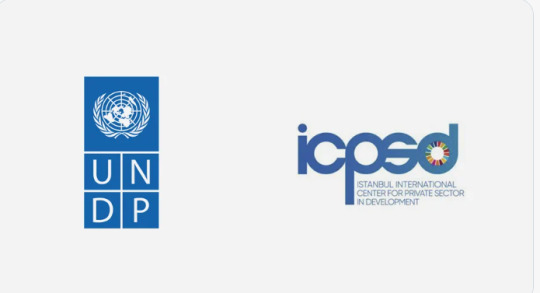
The UNDP and the IICPSD will launch the report “Harnessing the role of Private Sector in Waste Management through South- South Cooperation for Inclusive Urbanization” on September 12th, Starts at 9am EDT or 4pm UTC.
#Inclusive Urbanization#south-south cooperation#triangular cooperation#undp#Webinars#waste management#private sector
0 notes
Text
Highlight South-South cooperation’s role in tackling global challenges.
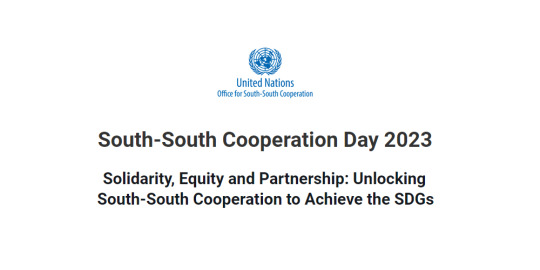
UNCTAD and its partners have kicked off a three-year global project to help developing countries use a common framework to measure and give more visibility to South-South cooperation.
The project’s first event, organized with Brazil from 11 to 13 July, brought together representatives from 16 countries across Africa, Asia and Latin America. Participants also included economists, statisticians and development experts from over 10 international organizations, including four UN Regional Commissions.
South-South cooperation – when developing countries pool resources or share knowledge, skills and expertise – is a powerful tool that can take many forms.
For instance, Mexico allocated $62 million from 2020 to 2022 for programmes in Honduras and El Salvador that helped improve food security and create jobs for young people, benefitting more than 40,000 people.
Other examples include Brazil and India’s collaboration on satellite technology to monitor deforestation and boost agricultural production, and Colombia and the African Union’s joint projects to empower women through aquaculture in Nigeria, Tanzania and South Africa.
“South-South cooperation is key to achieving the 2030 Agenda and became particularly pronounced during the pandemic when countries came together in solidarity,” said Sumeeta Banerji, a policy specialist at the UN’s Office for South-South Cooperation, who participated in the July event, held in Brasilia and online.
An incomplete picture
But historically global development discussions have leaned exclusively on data from cooperation that also involves developed countries or multilateral organizations – or both.
Without reliable data on South-South cooperation, the picture of international development cooperation remains incomplete.
In March 2022, the UN Statistical Commission introduced a new SDG indicator (17.3.1) to measure “additional financial resources mobilized for developing countries from multiple sources.”
It also welcomed a voluntary common framework designed by developing countries to measure South-South cooperation and provide data for the new indicator.
“Now we have a framework that is made by the South for the South,” Brazilian Ambassador Luiza Lopes of the Brazilian Cooperation Agency said.
“This truly is a historic milestone for South-South cooperation,” added Luciana Mendes Santos Servo, president of Brazil’s Institute of Applied Economic Research.
The UN Statistical Commission asked UNCTAD, as a co-custodian of the new SDG indicator, to coordinate with developing countries further work on the framework, including on reporting and capacity-building.
More than a tool
The framework was developed through a sub-group under the UN’s Inter-agency and Expert Group on SDG Indicators.
The process was inclusive and interactive, and the result reflects the actual practices of the global South – not in the traditional set-up of donor and recipient countries but as equal partners.
“It’s more than just a tool for measurement,” said Ms. Anu Peltola who leads UNCTAD Statistics. “It gives voice for the hope and solidarity of developing countries.”
Mr. Sukhbir Singh, chair of the sub-group that developed the framework, agreed: “For the first time, this framework enables developing countries to tell the story of their development cooperation in numbers and inform South-South cooperation policies with solid data.”
A shared responsibility
Moving ahead, it will be important for participating countries to secure political will and ensure efficient collaboration between government agencies, as data on South-South collaboration will come from many areas, such as health, energy, food security, education and environment.
Also, the scarce resources in many developing countries mean international and regional support will be crucial. Acquiring the national capabilities to consistently collect accurate data is a big task, requiring support from specialized, regional and international organizations.
“The journey ahead may be filled with challenges,” Ms. Peltola said, “but when countries come together with a shared vision, important results can be achieved.”
“It is now the shared responsibility of the UN and the developing countries to make this framework work and tell the story of the global South.”
The United Nations celebrates South-South cooperation every year on September 12th . This year, the day falls just a week before the highly anticipated SDG Summit, offering an opportunity to highlight South-South cooperation’s role in tackling global challenges – and the need to collect more and better data.
The UNCTAD helps countries measure #SouthSouth cooperation. Learn more:
#UNCTAD#south-south cooperation#triangular cooperation#sustainable development#development cooperation#globalchallenges
0 notes
Text
Panel discussion to mark the United Nations Day for South-South Cooperation 2023.
Watch the panel discussion to mark the United Nations Day for South-South Cooperation 2023 on the theme “Solidarity, Equity and Partnership: Unlocking South-South Cooperation to Achieve the #SDGs”.on 12 Sept, 3 pm NY time.

#SouthSouthCooperation#triangular cooperation#south-south cooperation#United Nations Day for South-South Cooperation#12 september#UNOSSC#UNDP#UNDESA#United Nations Office for South-South Cooperation#panel discussion
0 notes
Text
Solidarity, Equity and Partnership: Unlocking South-South Cooperation to Achieve the SDGs.

#south-south cooperation#triangular cooperation#United Nations Office for South-South Cooperation#High level event#United Nations Day for South-South Cooperation#12 september
0 notes
Text
Action now on water could be as beneficial to the planet as tackling the climate crisis

With levels of water scarcity soaring as annual water use rises by around 3,500 billion cubic metres (m3) globally over the last century, this deserves as much global attention as climate change. And increasing water circularity through global collaboration could have a hugely positive impact, by reducing drought risk, supporting climate goals and advancing social development to meet the United Nations Sustainable Development Goals.
Applying a circular economy mindset will help ensure a water-secure future
#water scarcity#annual water use#water circularity#drought risk#climate goals#sdg6#sdg13#world economic forum#climate crisis
1 note
·
View note